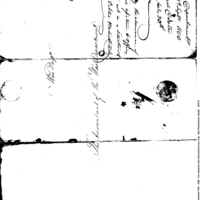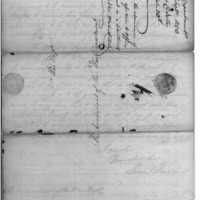Accounts for Medical Aid
Item
Type
Autograph Letter Signed
Title
Accounts for Medical Aid
Description
Medical aid should be offered to officers by the public. If at his post but there is no aid available, an officer should be permitted to seek and secure the best medical aid at the public expense. Officers on furlough are not entitled to publicly funded aid, as they have temporarily and voluntarily withdrawn from their contract with the public.
year created
1800
month created
09
day created
29
author
sent from location
War Department
recipient
in collection
notable person/group
William Simmons
Samuel Dexter
officers
the public
notable location
War Department
notable item/thing
medical assistance
medical aid
applications
accounts
regiments
general rule
contract
services
compensation
privileges
post
procure
additional expense
furlough
duties
notable phrase
undoubted right to procure the first best medical aid
document number
1800092900101
page start
1
number of pages
3
transcription
War Department
29th Septr 1800
Samuel Dexter
recd 30th
directing the allowance
of Medical assistance to officers
on duty not in a Substation to
obtain Public Medical Aid.
War Department
The Accountant of the War Department
War Department 29 Sept. 1800
Sir
I am induced by repeated applications being made to me for the admission of accounts for medical attendance on Officers distant from their Regiments or the regular medical aid provided for them to establish some general Rule on the subject.
On an Officer's entering into the Service, he forms a Contract with the public, by which for certain services he is to receive a certain compensation and to be entitled to certain privileges. Medical aid is one of the articles with which he is to be furnished by the public. If at the post or place where he is stationed, he be in want of that aid, and the public be not prepared to supply it, the Contract is in so much infringed by the public, and the Officer is not to suffer by the infringement; he has therefore an undoubted right to procure the first best medical aid it may be in his power to procure, and the public must bear the addition Expence. In case of an Officer being detached, the same reasons apply why the
public and not he should be burthened with the expence: he is constrained to quit a station where regular medical aid is supposed to be provided for him, and the public ought therefore to prevent him from suffering either by want of aid when needed, or by being compelled to pay for what he is entitled to receive as part of the compensation for his services.
An Officer on Furlough is differently situated: he voluntarily quits the place where medical aid is provided for him conformably to his contract with the public; he is, at his request, exonerated for so long a time from the duties attached to his office, in order that he may attend to his private business or to the gratification of whatever other inducements he may have had to request a furlough, and, thus withdrawing himself, the public is not to pay for medical aid which he may find it necessary to procure, at a place other than that at which the public are bound to supply him.
I am Sir Your Obed Servt
Saml Dexter
The Accountant of the War Dept.
29th Septr 1800
Samuel Dexter
recd 30th
directing the allowance
of Medical assistance to officers
on duty not in a Substation to
obtain Public Medical Aid.
War Department
The Accountant of the War Department
War Department 29 Sept. 1800
Sir
I am induced by repeated applications being made to me for the admission of accounts for medical attendance on Officers distant from their Regiments or the regular medical aid provided for them to establish some general Rule on the subject.
On an Officer's entering into the Service, he forms a Contract with the public, by which for certain services he is to receive a certain compensation and to be entitled to certain privileges. Medical aid is one of the articles with which he is to be furnished by the public. If at the post or place where he is stationed, he be in want of that aid, and the public be not prepared to supply it, the Contract is in so much infringed by the public, and the Officer is not to suffer by the infringement; he has therefore an undoubted right to procure the first best medical aid it may be in his power to procure, and the public must bear the addition Expence. In case of an Officer being detached, the same reasons apply why the
public and not he should be burthened with the expence: he is constrained to quit a station where regular medical aid is supposed to be provided for him, and the public ought therefore to prevent him from suffering either by want of aid when needed, or by being compelled to pay for what he is entitled to receive as part of the compensation for his services.
An Officer on Furlough is differently situated: he voluntarily quits the place where medical aid is provided for him conformably to his contract with the public; he is, at his request, exonerated for so long a time from the duties attached to his office, in order that he may attend to his private business or to the gratification of whatever other inducements he may have had to request a furlough, and, thus withdrawing himself, the public is not to pay for medical aid which he may find it necessary to procure, at a place other than that at which the public are bound to supply him.
I am Sir Your Obed Servt
Saml Dexter
The Accountant of the War Dept.
Item sets
Document instances
| In image | In source | Location in source | |
|---|---|---|---|
| [view document] (3 pages) | ZKA12 (3 pages) | Collection: Post Revolutionary War Papers, 1784-1815. (RG94) | B: 69 |
| [view document] (3 pages) | ZKA12a (3 pages) | Collection: Post Revolutionary War Papers, 1784-1815. (RG94) | B: 69 |
Document names
| Type | Name | Location | Notes |
|---|---|---|---|
| Author | Samuel Dexter | War Department | [n/a] |
| Recipient | William Simmons | [unknown] | [n/a] |


